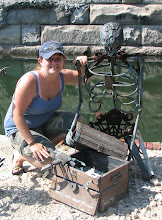
Jules and Jim was an entirely new film experience for me in a lot of ways. The style Truffaut used in making it was one that’s not seen very often in American film to my knowledge. It was a lot like what I’d imagine real-life to be if you tried to go back and relive your life through memories—
some parts seem ideal and unrealistic, others are marred by images seen on film or TV, some pass slowly and blissfully, while much of life is a hurried blur. But the core of all these memories is the people that were most important to you and the complex relationships you formed along the way.
Jules and Jim were the best of friends, and even when their lives were entirely interrupted by the crazy, whimsical, free spirit Catherine, their ties remained close and loving. Characters like Catherine are seen a lot in movies, but I’ve never seen one draw two people in so close and then destroy them both the way she did. Catherine seemed so free and independent all throughout the movie, but her unwillingness to let Jim marry another woman and move on proved that she had grown as dependent on the two men as they had on her. Once I realized that when she pulled a gun on Jim, I wasn’t surprised at all that she killed them both in the end just to prove she was still in control. What shocked me was that she didn’t kill Jules too, because although they weren’t still lovers in the end, they still had rather close ties that couldn’t be shaken off. I guess she was at least a good enough mother to spare his life for the sake of their daughter, even if she was radical and uncaring towards everything else in life.

What really got be about this movie was the way poor Jim kept going back to Catherine even though he knew it would never work and that she was completely unstable. I’m not sure that it was really her that made him do it each time, but rather it was the hope he had for those ideal moments they all shared to be relieved just once more. I guess no one ever told him that things are rarely as good as you remember them to be. It’s like when you love a TV show as a kid, but then watch reruns later and it just seems dumb to you then. All your fun memories of it are tarnished by the new realization that it just wasn’t that funny. What broke my heart most about the sad ending of this movie was thinking about Jules having to live without either of his close friends. Not only will he miss them being around, but after seeing Catherine drive them off a bridge, how will even be able to think of them the same way again? All of those wonderful memories the three of them shared will be ruined by the thought that Catherine was really crazy enough to kill them all along. At least for me that would be the case; an image that horrifying would undoubtedly be burned in my memory forever.












